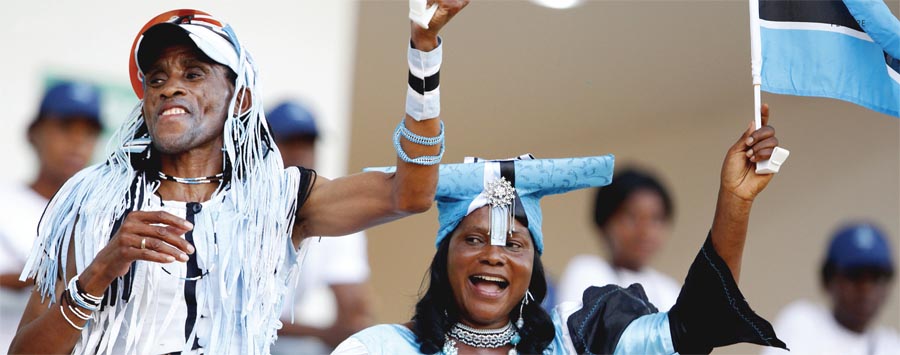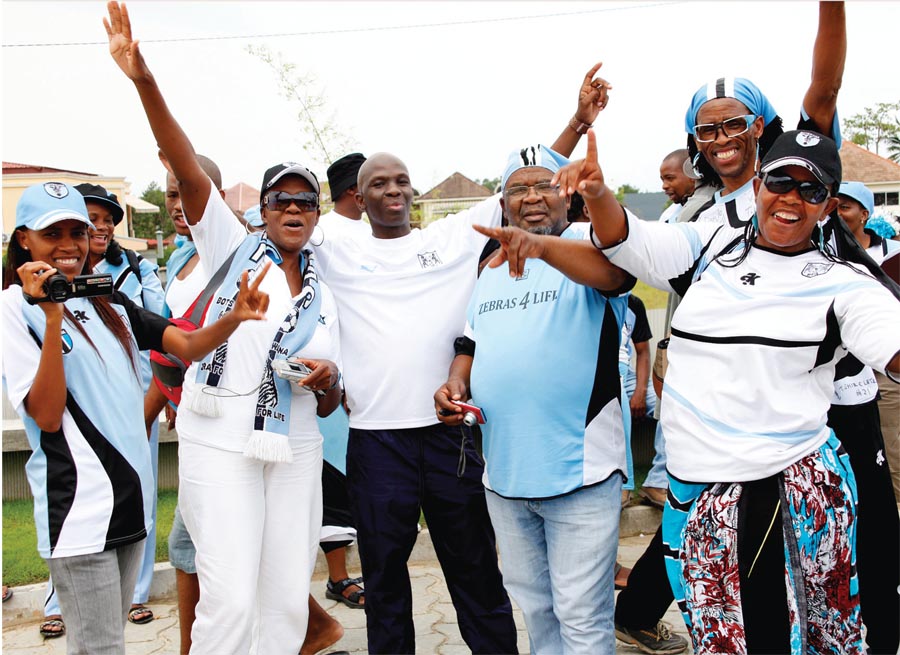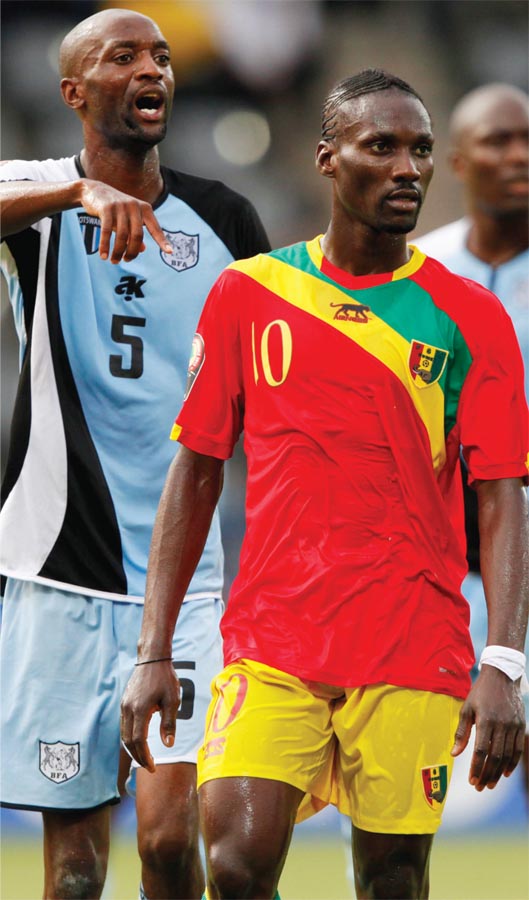\'Homage to our boys\'
Source : Kutlwano
Author : Pako Lebanna
Location : Gaborone
Event : Interview
The lyrics of Irish rock band, Thin Lizzy’s 1976 classic, “The Boys are Back in Town” could not help playing in one’s mind as flags waved and hooters blared the morning the Zebras descended on home soil after their exploits at the 2012 Orange Africa Cup of Nations (AFCON). Like a battle scarred war hero arriving home, the Zebras must have been glad to return home, knowing full well that their experience had stood them in good stead for future assignments.
According to historical accounts, Bakwena royal, Sechele I, defeated the Boers of the Transvaal in the Battle of Dimawe of 1852/3 but only after retreating to the fortress that was Dithubaruba Hill. As the Sotho are wont to say, ‘ho chechela moraho ha se ho baleha, empa ke ho nka maatla,” (retreating is not a sign of cowardice, it is about drawing strength).
Likewise, AFCON 2012, especially the result against Guinea, took the Zebras few steps backwards against a burning desire to take a giant leap forward. The tournament gave Botswana football the necessary exposure though, revealing areas which need to be worked on for the Zebras to conquer the continent.
On the evening of Tuesday, January 24, Batswana immersed in pride, watched their national football team standing shoulder to shoulder with Ghana at Stade de Franceville in Gabon in the opening AFCON, the Group D fixture. Ghana, who missed a 2010 World Cup semi-final berth by a whisker, entered the pitch as firm favourites, not just for the Botswana tie. They shot into the tournament as one of the favourites to go all the way and win a trophy they had not hoisted for 30 years.
However, the Zebras went on to give a great account against quality opposition, restricting the Black Stars to a single goal victory. A week later they lost by only a 2-1 margin to an equally star studded Mali side. The day the team returned home, on the morning of Friday, February 3, Batswana gave the Zebras a hero’s welcome. Scores of fans lined the Sir Seretse Khama International Airport to cheer their heroes who, the embarrassing Guinea score line apart, had done their best to hoist the nation’s flag high before a global television audience.
Upon arrival, the Zebras proceeded to a packed University of Botswana Stadium, and an excited crowd chanted the players’ names and sung. More than anything, it was a celebration of arrival of the country’s national sport on the international stage. For decades, Botswana had attempted in vain to have local football gain the attention of the African continent.
Players such as Clement “Captain Muller” Mothelesi, Willie “Paymaster Jack” Dennison, Ambrose “Walker” Rathedi, City Senne, Jomo Mosweu, Patrick Zibochwa, Terence Mophuting, Nephtally “Scara” Kebalepile, Itumeleng “Tummie” Duicker, Tshepiso “Sox” Molwantwa, had over the years toiled for the Zebras course.
Together with administrators such as Ismail Bhamjee, Ashford Mamelodi and others, these legends of the local game tried in vain to take Botswana football to the continental stage. However, their effort in paving the way bore fruit as Tshosane and his squad gave the country recognition, eliciting the heroes’ welcome at UB. “I would like to thank my teammates for the effort they put in at the AFCON,” captain Mompati Thuma said, to a thunderous applause from the UB crowd. “We have learnt a lot and in the future we will do better.
We thank the fans for always being supportive.” When coach Tshosane stood up to speak, the crowd bellowed one of their supporters’ tunes. “Mokatisi, Stan Tshosane, re adime sepannere re bofe team e, team e!”
“We took a long journey that begun with the preparation camp in Cameroon,” the affable Tshosane said. We were unfortunate that we lost a key player just before the tournament when Joel Mogorosi got injured.
“Sadly, we lost all the games, the Guinea result was terrible. We had a player injured (Ofentse Nato) and his replacement (Patrick Motsepe) was red carded. Guinea had the numerical strength but that is not an excuse, we lost,” said Tshosane.
He paid tribute to the players and the supporters for the effort collectively put in for what turned out to be a learning curve for the national sport.
Going forward, the Zebras will need support from various national stakeholders, and will have been heartened by the commitment from the highest office.
“As the government, we will continue supporting the Zebras and other national squads,” Minister of Youth, Sport and Culture, said Shaw Kgathi.
“The team has made us proud and we should continue to give them the necessary support. The whole continent now knows about our football, and the AFCON tournament was a precursor to a great year for our sport, as the Olympics take place later, and we expect a lot from our athletes, such as Amantle Montsho,” added Kgathi.
Botswana Football Association (BFA) president, David Fani, soldiered on despite his voice being at times drowned out by a rowdy crowd that wanted to carry on with a carnival atmosphere and cared less about speeches.
“We must give the team the credit they deserve. We urge Batswana to close ranks around the Zebras, give them their full support. The most important thing is that we learn from our mistakes; the association, the government, the sponsors, the supporters, the team, the media; we all should learn from this experience,” Fani said.
The former Gaborone United administrator said BFA wanted to see the Zebras qualify for AFCON 2013 and 2015 as well as 2014 FIFA World Cup, slated for Brazil. Notwithstanding, he acknowledged that it would not be smooth sailing. “One of the things we need to improve on is the finances. We thus make a plea for adequate funding for the BFA, for the Zebras and the development structures to ensure continuous supply to the senior squad,” pleaded Fani.
The BFA leader said their task was to ensure the establishment of a conveyor belt that churned out talent every generation so that Botswana football was incessantly on the map. However, he noted the lack of funding for development, and said even though Botswana’s economy was relatively small, government and private companies had to muster resources to ensure the sort of national pride fostered during AFCON 2012 was maintained.
And fostered it was. During AFCON matches, Batswana were proudly clad in the sky blue, black and white of their national flag, wearing Zebras replica jerseys and an assortment of garments that expressed support for their team. Political rivalries were set aside, supporters of competing football teams cast asunder their differences as the nation stood in unison.
When Ghana skipper, John Mensah, felled Jerome Ramatlhakwane Batswana momentarily believed the Zebras had a penalty; when Dispy Selolwane provided the equalizer against Guinea with a spot kick, and when Mogakolodi “Tsotso” Ngele scored the opening goal against Mali, Batswana jumped in triumph, hugged and kissed each other.
For those few seconds in the three games, Batswana felt on top of the world. Though each of those games ended in defeat, the performances against Ghana and Mali made Batswana believe in a bright future for their team.
At Game City in the south of the capital, the Zebras’ official sponsors organized a fan park and multitudes gathered there to create an electrifying atmosphere.
Even after the 6-1 loss to Guinea, Batswana remained defiant. Some got on the plane and went to add to the numbers of those who had travelled to support the team in Gabon. For those remaining home, the flag kept being hoisted, and they continued to sing songs of encouragement to their team.
The squad faced formidable opposition at their maiden tournament, as evidenced by the fact that their Group D rivals Mali and Ghana finished third and fourth respectively.
The Republic of Guinea squad, affectionately known as Syli Nationale (the National Elephant), were playing in their tenth AFCON tournament, their first appearance having taken place in 1970. They came second in the 1976 tournament having lost to the Atlas Lions of Morocco.
Syli Nationale have been dumped in the group stages no less than four times and failed to qualify for the previous AFCON tournament -Angola 2010. They had in recent times managed to reach the quarterfinals in three successive tournaments (2004, 2006 and 2008).
The Black Stars of Ghana, who came second at AFCON 2010 and third when they hosted the 2008 edition, are a team with great pedigree, having won the tournament no less than four times, though their last triumph was a good three decades ago -1982.
But their future looks bright, with their under 20 squad having won the World Youth Cup in 2009. The Eagles of Mali, who came second in 1972, are also a side that was bringing a wealth of experience to the tournament, with players such as FC Barcelona’s Sedou Keita. Keita trains daily and plays week in week out alongside the likes of Lionel Messi, Andreas Iniesta, Xavi Hernandez, among other global stars.
The Zebras were by no means overawed by such quality opposition. In the first match against Ghana, they defended well and then took the game to the Black Stars. Jomo Moatlhaping on the right wing played a blinder, literally playing two role at once given that on numerous occasions he was tracking back to cover for Tshepo Motlhabankwe at right back.
Phenyo Mongala and Mosimanegape “Twizzer” Ramohibidu on the left flank also had an inspirational game against the Ghanaians.
The moment Mongala back heeled the ball, and then walked casually towards the Ghana 18 yard box, while Ramohibidu delivered a cross that Moatlhaping nearly scored-Mensah saved the ball on the line-was a moment of brilliance Mongala will be remembered for even when his playing days are over.
That was the sort of confident exuberance that signaled Botswana’s arrival on the big international football stage. Youthful Ngele’s performance made him the toast of the Zebras supporters. They know that in him, Botswana has a player capable of becoming a
Now it is time to take stock, retreat and learn from the short falls; how brutally exposed the right back was against Guinea-without a right winger who tracked back as was the case against Ghana.
How Syli Nationale crossed the ball with ease and shipped six goals past Modiri Marumo, who conceded just three goals in eight home and away qualifying matches against Tunisia, Togo, Malawi and Chad but went on to concede nine times in just three games in the tournament proper.
How important it is for every outfield position to have at least two natural players -when the only proper left back Tshosane took with him-Ramohibidu -lost his place due to illness. Musa Ohilwe, a natural right footed centre back who can be applied at right back, was played in an unfamiliar left back role, since Tshosane had left behind players such as Edwin Olerile, who might have provided the requisite backup in that position.
Then there is the question of whether Abednico Powell, a player who was never used, was the right replacement for Mogorosi.It is time to take stock, empower the team and take the Zebras to the next level.















